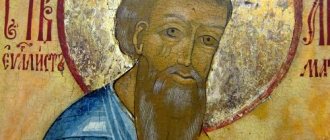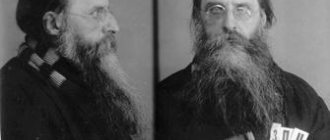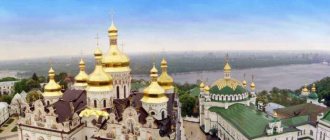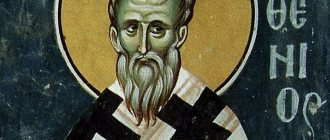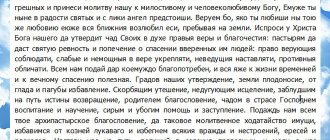Venerable Pimen the Great
Nowadays there are not many Christians in Egypt, but in the 6th–5th centuries it was in this Muslim country that the greatest pillars of faith and piety appeared. The Monk Pimen the Great became one of them.
He was born around 340 into a pious family. This can be judged at least because three brothers at once - Pimen, Anuvius and Paisius - simultaneously went to a small Egyptian monastery, where they accepted the monastic feat. Nothing is known about the life of the latter, but Anuvius is glorified among the saints as a venerable hermit of Egypt (Feast Day June 5). Anuvius spent his entire life in one monastery, and Pimen often changed monasteries in order to avoid human glory.
It was hard for the mother to lose three beloved children at once, and so she came to the monastery to see them. However, the doors of the cells were locked for her. She cried for a long time at the entrance, but her heart devoted to Christ did not waver, and Pimen told his mother that there would be no meeting. “If you endure a temporary separation from us,” he said through the closed door, “then you will see us in your future life, so we hope for God’s love for mankind!” Only after these encouraging words did the mother humbly go home.
The Monk Pimen with his life confirmed the name given to him, translated from Greek meaning “shepherd, shepherd.” He instructed and admonished his disciples in a fatherly manner. And they, in turn, wrote down his tips and advice. The local ruler also wanted to listen to the pious monk, having heard about his faith and virtues. But Pimen did not want fame and boldly refused the request.
Avva Pimen was a very simple man. Avoiding talking about the sublime, he shared what formed the basis of the life of an Orthodox Christian. He might not deign to pay attention to a conversation about something abstruse and complex, but if a person asked from the heart how to deal with spiritual passions, he was glad that the interlocutor was advocating for his salvation, and taught for a long time on how to overcome deep-seated sins.
One day, a certain hermit, having heard about Pimen, who settled nearby with his disciples, became angry because he envied him. However, Abba Pimen did not want to leave his brother in Christ in sin. He went to him with refreshments and waited for the old man for a long time under the scorching sun of the Egyptian desert, because his heart burned with sorrow for him. Seeing this feat and feeling the gentleness of the Monk Pimen, the elder accepted it. He admitted that everything heard about him was fair, adding that he saw “good deeds a hundred times greater.”
The Monk Pimen himself established his own measure of asceticism and did not demand such feats of fasting as he himself performed. It is known that he fasted very strictly, sometimes going without food for more than a week. But he advised his disciples to eat every day without getting fed up. True, a reminder not only about food is appropriate here. Having heard that a certain monk ate once a week, but was angry with his brother, the saint said with sorrow: “I learned to fast for six days, but cannot abstain from anger even for one day.”
The Monk Pimen lived on earth for 110 years, instructing his students and inspiring by his example. He departed to the Lord around 450 and soon after his death he was canonized. They began to call him great in recognition of his great works of humility, modesty, truthfulness and selfless service to God.
More than two hundred sayings of St. Pimen the Great were recorded by his disciples. At the same time, the saint not only conveyed the sayings of the elder fathers, but also uttered wise thoughts from his heart. Here are some of his most famous apothegms.
“A person must follow three main rules: fear God, pray often and do good to people.”
“Anger will never destroy anger. If someone has done you evil, do him good, and your good will overcome his evil.”
“Whoever speaks for God’s sake does well, and whoever is silent for God’s sake also does well.”
“It happens that a person seems silent, but if his heart condemns others, then he always speaks. And there are those who speak with their tongues all day long, but remain silent within themselves, because they do not condemn anyone.”
Pimen the Great was very humble. He often sincerely exclaimed: “I will be thrown into the place where Satan will be thrown!”
One monk asked: “Should a brother who has sinned be covered with silence if he happens to see him?” The elder answered: “If we hide the sins of our brothers, then God will hide our sins, and if you see a brother sinning, do not believe your eyes and know that your sins are like a log, and your brother’s sins are like a branch, and then you will never come into confusion and temptation."
Another monk turned to the monk, saying: “I have sinned gravely and want to spend three years in repentance. Is such a period sufficient?” The elder answered: “This is a lot.” The monk continued to ask what period of repentance the monk would consider necessary for him - a year or forty days? The elder said: “I think that if a person repents with all his heart and makes a firm intention not to return to sin again, then God will accept his three-day repentance.”
“If a person has fire on one side of him and a vessel with water on the other, then when the fire catches fire, he takes water from the vessel and extinguishes the fire. Likewise, evil thoughts inspired by the enemy of our salvation can, like a spark, ignite sinful desires in a person. It is necessary to extinguish these sparks with water, that is, with prayer and the aspiration of the soul towards God.”
“If nobles begin to come to me and honor me, then many people from the people will begin to come to me and disturb my silence, and I will lose the grace of humility, which I acquired with the help of God.”
09.09.2018
Memory 27 August / 9 September
Saint Pimen lived at the turn of the 4th–5th centuries. He was born in Egypt. At the age of 15, Pimen joined his six brothers who labored in the Skete desert: Abba Anuvius was the eldest, and Paisius the youngest.
While still young, Pimen went to ask an old man about three thoughts that were bothering him, but during the conversation he forgot about one of them. Returning to himself and remembering him, he immediately went out and ran a long distance that separated him from the elder in order to cast his thoughts before him. The elder, surprised by his concern for the purity of his heart, predicted: “Pimen, your name will be pronounced throughout Egypt, and you will truly become a shepherd of a huge flock.”
In 407, the Mazik barbarians devastated the monastic settlements in the Skete desert. Seven brothers escaped death by following the road of saltpeter miners. They settled in Terenuf, in Upper Egypt, on the banks of the Nile River.
Pimen gained great fame there, so that pious people left the elders, from whom they were in the habit of asking advice, and came to him with questions. When a certain visitor came to ask Abba Anuvius, he sent him to Pimen, realizing that his brother had been awarded the gift of spiritual guidance. But Pimen never spoke in the presence of his elder brother and refused to speak in front of another elder, although he surpassed them all.
The mother of seven brothers, having learned where her sons had gone, went to visit them, but was met with a decisive refusal. Therefore, she settled down near the church and began to wait for the ascetics to come to her for the weekly service. Seeing their mother, the sons immediately went back. She ran after them and, finding the door closed, began to moan pitifully. Pimen answered her from the inside: “What do you prefer: to see us here or in the coming century?” She exclaimed, “Am I not your mother? Didn't I breastfeed you? Now my hair has turned grey, can’t I see you?” He explained: “If you force yourself not to see us here, you will see us there in eternity.” And the pious mother left full of joy, saying: “If I definitely see you there, then in that case I no longer want to see you here.”
At first, Pimen fasted a lot, often spending two or three days without food, subjecting his body to extremely severe restrictions. But over time, he acquired great experience in spiritual science and, having become a doctor, helmsman and beacon of reasoning for the inhabitants of the desert, he taught to eat moderately every day, so as not to fall into pride or gluttony and thus follow the royal path, which is easy and unburdensome. To one brother who was tempted by one day finding him washing his feet, he answered: “We learned to kill not our bodies, but our passions.” He also often said: “Everything that exceeds measure comes from demons.”
Moderate in asceticism, he was, however, extremely stern when it came to relationships with people. He considered his cell a grave in which the monk, like a dead man, should remain alien to any earthly attachments. One day the ruler of that region, wanting to see him, ordered his nephew to be arrested so that the elder would come to intercede for the young man. But Pimen remained insensitive to his sister’s pleas, saying: “Pimen did not give birth to a son.” And he ordered the governor to be told to judge him according to the laws if the young man had sinned.
When a visitor wanted to talk to him about sublime subjects, the elder remained silent; but if he was asked about passions and how to heal the soul, then he answered joyfully. He gave his interlocutors answers corresponding to their understanding and their capabilities in order to encourage success in virtue. First of all, he advised not to give room to passionate thoughts by pleasing them or trying to respond to them, and argued that they would thereby disappear by themselves: “We cannot prevent them from coming to outrage us, but it is in our power to resist them.” He taught that to throw oneself before God, not to evaluate oneself, and to leave behind oneself all one's own will - all these are means for the purification of the soul, but mainly through self-condemnation and wakefulness it can rise up and move towards perfection.
When he was once asked whether we should reproach a brother whom we saw sinning, Pimen replied: “In the hour when we conceal our brother’s offense, God will hide ours, and in the hour when we reveal our brother’s offense, God will also reveal ours.” " And when the elder saw how one brother fell asleep in the church, instead of reproaching him, he preferred to put his head on his lap and allowed him to rest. As for vigilance towards himself, he observed it strictly at all times, knowing that the beginning of all vices is absent-mindedness. When he had to leave his cell, he would first spend an hour sitting and examining his thoughts.
He also said that “man needs humility as the breath that comes from his nostrils,” and that we can achieve this humility, which gives us peace in any circumstances, through self-abasement, which makes us consider our brother as our superior. As for him, he reached such a degree of self-contempt that he frankly declared: “I cast myself into the place where Satan was cast, and place myself below foolish creatures, because I know that they are not subject to punishment.” When he was asked how it was possible to consider himself lower than any creature and even a murderer, the elder replied: “He committed only this offense, but I kill every day.”
Having once seen a woman crying at the grave of her husband and son, Abba Pimen told brother Anuvius that if you do not acquire such a state of grief and constant mortification of the flesh, it is impossible to become a monk. Another time he was raptured in the presence of one of his relatives, who asked where he had been transported. Pimen replied: “My thought was where the Holy Mother of God is, crying at the Cross of the Savior, and I would like to cry like that all the time.”
One day, famous people came to the saint from Syria to ask about the purity of his heart, but the elder did not know Greek, and there was no translator. Noticing the predicament of the visitors, Pimen suddenly began speaking in Greek and said: “By nature, water is soft, and stone is hard; but a waterskin suspended over a stone, dropping water drop by drop, will make a hole in the stone. This is how things are with the word of God: it is tender, and our heart is hard, but a person who listens to it often opens his heart to the fear of God.”
Abba Pimen shone like a star in the desert for many years, teaching with his own experience and becoming a living example of all virtues. He rested peacefully some time after Saint Arsenius (after 449), never seeing the Skete hermitage again.
1 Pimen (potmen) in Greek means “shepherd”, “shepherd”. More than 200 sayings, amazing in depth and wisdom, make Pimen a paramount figure in various collections of apothegms. Since he often conveys the sayings of previous fathers, it is believed that the first collections of apothegmas were compiled among the disciples of Abba Pimen.
From the book “Synaxarion: Lives of the Saints of the Orthodox Church,” published by the Sretensky Monastery Publishing House.
Compiled by Hieromonk Macarius of Simonopetra, adapted Russian translation by Sretensky Monastery Publishing House
IV. Mikhail Tverskoy
In addition to the fresco of Procopius the Righteous, in the Pimenovsky Church there is a fresco of Mikhail Tverskoy, who suffered martyrdom in the Horde under Uzbek Khan.
| Mikhail Tverskoy (right). Fresco in the Pimenovsky Church |
Perhaps this is the only fresco in Moscow by Mikhail Tverskoy, who was a formidable rival of Moscow. Not without the help of the Horde and the marriage of Moscow Prince Yuri with the sister of Khan Uzbek, Moscow defeated Tver in the struggle for control of Russian lands.
Tver is the cradle of the Moscow princes (Danilovichs) - the first Moscow prince Daniil Alexandrovich - the youngest (fourth) son of Alexander Nevsky, after the death of his father, was brought up in Tver in the house of his uncle Yaroslav Yaroslavovich. Daniil was barely 2 years old when in 1263, on the way from the Golden Horde to the capital Vladimir in Gorodets Radilov on the Volga, his father, the Grand Duke of Vladimir Alexander Nevsky, died. Moscow with its volosts was allocated to him from the territory of the Grand Duchy of Vladimir according to his father’s will. Daniel's grandmother (mother of Alexander Nevsky) - Bohemian Princess Maria - niece of Frederick Barbarossa - one of the leaders of the crusades.
Mikhail Tverskoy (11/22/1318) – Prince of Tverskoy (from 1285) and Grand Duke of Vladimir (1305–1317), nephew of Alexander Nevsky:
• The first of the Russian princes to bear the title “Grand Prince of All Rus'”.
• The ruler of the Tver principality was killed in the area of present-day Budenovsk on the orders of Uzbek Khan (1313–1342).
• On December 22, 1317, Mikhail Tverskoy defeated Yuri of Moscow in a battle near the village of Bortenevo (50 km from Tver). Unexpectedly, Yuri Konchak’s wife died in captivity in Tver. Mikhail Tverskoy was forced to go to trial before Uzbek Khan.
• On November 22, 1318, in the foothills of the Caucasus, near the Krestovy pass (now the city of Budenovsk), Mikhail was put to death / killed by the servants of Yuri of Moscow. According to legend, the prince’s heart was cut out while he was still alive. Martyrdom in the Horde became one of the main reasons for the canonization of Mikhail Tverskoy in 1547 under Ivan the Terrible, who needed martyrs for the faith on the eve of the campaign against Kazan.
• Michael's body was transferred to Moscow and buried in the Spassky Monastery. Thus, he became the first of the rulers of Russia to be buried in the future capital . A year later, the prince’s widow and children bought and transferred Mikhail’s body to Tver for a lot of money.
Prayer
O wondrous saint, our reverend father Pimen, we, sinners, are perplexed, out of duty to praise you. For you were the image of monks, the giver of healings, the inhabitant of the desert, the healer of silence, the eradicator of passions and the teacher of all virtues. For this reason, we fall tenderly to you and humbly ask: give from your treasury to our poverty. By your humility put down our pride; by dispassion our passions have fallen; by being awake, drive away the spirit of laziness from us; Awaken our insensibility with tear currents; Revive us with vigil from negligence; With your prayers, kindle the flame of prayer in us; Make us brotherly with love; Give us the spirit of meekness and humility, the spirit of purity and piety; Free us from passions and lead us to true repentance. You constantly had in your mind the Son of God crucified for us on the Cross. May we, the damned, constantly have that sweetest Name in our minds and hearts, so that with His love, burning and thinking about our sins, we will prepare to meet that terrible Day of Judgment and be worthy to enter the Kingdom of Heaven with you and all the saints, glorifying the Father and the Son and the Holy Spirit forever and ever. Amen.
